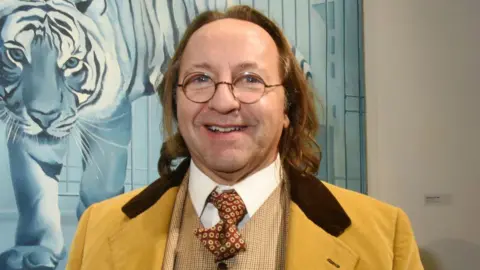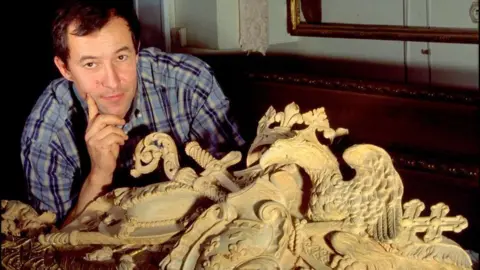 Getty Images
Getty ImagesTwo French antiques experts have been convicted of forging historic chairs that they claimed had once belonged to French royals such as Marie Antoinette.
Georges “Bill” Pallot and Bruno Desnoues were given four months behind bars as well as longer suspended sentences for selling a number of fake 18th Century chairs to collectors including the Palace of Versailles and a member of the Qatari royal family.
As both have already served four months in pre-trial detention, they will not return to prison.
Another defendant, Laurent Kraemer, who – along with his gallery – was accused of failing to adequately check the chairs’ authenticity before selling them on, were acquitted of deception by gross negligence.
Wednesday’s judgement was the culmination of a nine-year investigation that rocked the French antiques world.
At a court in Pontoise, north of Paris, the judge also handed out hefty fines to Pallot and Desnoues of €200,000 (£169,500) and €100,000 respectively.
Reacting to his sentence, Pallot said it was “a little harsh financially”, but he was glad that his Paris apartment would not be seized, according to AFP news agency.
During the trial, the prosecution had argued that Laurent Kraemer and his gallery in Paris were at fault for failing to sufficiently check the authenticity of the items they bought, before selling them on to buyers such as Qatari prince Mohammed bin Hamad Al Thani, who bought two chairs said to have belonged to Marie Antoinette for €2m.
But on Wednesday, Mr Kraemer and the gallery were acquitted. They always denied knowing about the forgeries.
In a comment sent to the BBC, his lawyers said the verdict “demonstrated the innocence that the Kraemer gallery has been claiming since day one of this case”.
“The gallery was the victim of counterfeiters; it didn’t know the furniture was fake, and it couldn’t have detected it, as the judgment indicates,” Martin Reynaud and Mauricia Courrégé said.
“For almost 10 years, our clients have been wrongly accused. They have waited patiently for the truth to appear. It is now done, and it is a great relief for them to see their innocence recognized today,” they added.
At the height of his career, Pallot was considered the top scholar on French 18th-Century chairs, having written the authoritative book on the subject.
He was also a lecturer at the prestigious Sorbonne University in Paris, with access to Versailles Palace’s historical records, including inventories of royal furniture which had existed at the palace in the 18th Century.
Pallot was able to pinpoint which chairs were unaccounted for in collections and then make replicas with the help of Desnoues, an award-winning sculptor and cabinetmaker who was employed as the main furniture restorer for Versailles.
“I was the head and Desnoues was the hands,” Pallot told the court during the trial in March.
“It went like a breeze,” he added. “Everything was fake but the money.”
 Getty Images
Getty ImagesProsecutor Pascal Rayer said in his closing arguments at the trial that the case shone a “rare and remarkable spotlight on the market for historical furniture, bringing to light a world that has been stamped with confidentiality and discretion.”
He said it revealed the flaws of the market and “the conflicts of interest inherent in its structure, particularly where experts such as Bill Pallot, and his accomplice woodcarver Desnoues, are also merchants, undisclosed to the buyer”.
Mr Rayer said the case had “resulted in the disruption of an entire marketplace, thereby highlighting the need for more robust regulation of the art market to achieve transparency and fairness of transactions”.
Other cases that have emerged from the murky world of antiques dealings in France in the past decade include that of the late Jean Lupu, who was also accused of selling fake royal furniture of the 17th and 18th Centuries to galleries around the world. He died in 2023 before he was due to appear in court.
Anurag Dhole is a seasoned journalist and content writer with a passion for delivering timely, accurate, and engaging stories. With over 8 years of experience in digital media, she covers a wide range of topics—from breaking news and politics to business insights and cultural trends. Jane's writing style blends clarity with depth, aiming to inform and inspire readers in a fast-paced media landscape. When she’s not chasing stories, she’s likely reading investigative features or exploring local cafés for her next writing spot.







